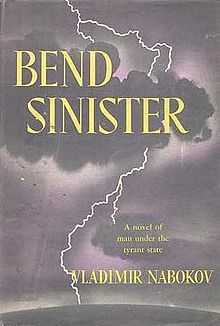Bend Sinister (novel)
| Bend Sinister | |
|---|---|
 Cover of the first edition | |
| Author | Vladimir Nabokov |
| Country | United States |
| Language | English |
| Genre | Dystopian fiction |
| Publisher | Henry Holt and Company |
Publication date | 1947 |
Bend Sinister is a dystopian novel written by Vladimir Nabokov during the years 1945 and 1946, and published by Henry Holt and Company in 1947.
The title
A "bend sinister" is a heraldic charge: A bar drawn from the upper left to the lower right on a coat of arms (from the point of view of the person wearing the shield). A bend, the standard stripe on a coat of arms, is the reverse: It crosses from the right shoulder of the wearer to the lower left side of the trunk. A standard bend is sometimes called a bend dexter to distinguish it from the bend sinister.[1] Bends sinister have sometimes been used in heraldry to symbolize a bastard son. In a 1963 edition of the book, Nabokov explains that "this choice of a title was an attempt to suggest an outline broken by refraction, a distortion in the mirror of being, a wrong turn taken by life."
In the novel, Nabokov often uses wordplay concerning leftward (or "sinister") movements.
Plot summary
This book takes place in a fictitious European city known as Padukgrad, where a government arises following the rise of a philosophy known as "Ekwilism", which discourages the idea of anyone being different from anyone else, and promotes the state as the prominent good in society. The story begins with the protagonist, Adam Krug, who had just lost his wife to an unsuccessful surgery. He is quickly asked to sign and deliver a speech to the leader of the new government by the head of the university and his colleagues, but he refuses. This government is led by a man named Paduk and his "Party of the Average Man." As it happens, the world-renowned philosopher Adam Krug was, in his youth, a classmate of Paduk, at which period he had bullied him and referred to him disparagingly as "the Toad". Paduk arrests many of the people close to Krug and those against his Ekwilist philosophy, and attempts to get the influential Professor Krug to promote the state philosophy to help stomp out dissent and increase his personal prestige.
Paduk tries to entice Krug with various offers, but Krug always refuses. Finally, Paduk orders the kidnapping of Krug's young son, David, for a ransom. After Krug capitulates and is prepared to promote the Ekwilist philosophy, Paduk promises David's safe return. However, when David is to be returned to him, Krug is horrified to find that the child he is presented is not his son. There has been a mix-up, and David has been sent to an orphanage that doubles as a violent prisoner rehabilitation clinic where he was tortured and killed when he was offered as a "release" to the prisoners.
Paduk makes an offer to allow Krug to personally kill those responsible, but he swears at the officials and is locked in a large prison cell. Another offer is made to Krug to free 24 opponents of Ekwilism, including many of his friends, in exchange for doing so. He accepts in complete lucidity, then, as the author feels pity, a beam of light comes down and strikes him insane leading him to charge Paduk.
Characters
- Adam Krug, university philosopher and protagonist. Krug is the foremost writer and thinker of Padukgrad. His cooperation with and endorsement of the Party of the Average Man is crucial to the regime's international relations.
- Olga, Adam's late wife
- David Krug, Adam's son
- Paduk (nicknamed Toad), dictator of Padukgrad; former school mate of Krug
- Dr. Azureus
- Hustav
- Ember
Notes
- ↑ Encyclopedia Britannica 1987 article on heraldry
| ||||||||||||||||||||||||||||||